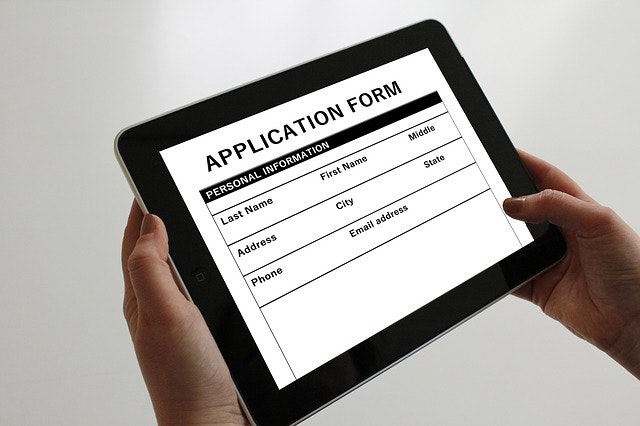Online Job Applications
In a bid to streamline procedures, most employers now require applicants to apply online.
Online job applications can involve lengthy application forms, aptitude tests or video interviews. They can also be a simple case of sending a CV and cover letter by email.
In this article, we'll cover what to expect when applying online, how an ATS works, and ten useful tips for your online applications.

Why Do Employers Prefer Online Applications?
Going paperless makes sense environmentally and also has numerous other benefits:
-
Online applications are time-saving. Some job postings attract hundreds of applications, which would otherwise need to be sorted by hand.
-
Online applications are an efficient way to identify the most suitable candidates for the role. When designed in a standard format and with set questions, online applications can be scanned quickly – making it much easier for employers to compare candidates and prepare a shortlist. This is particularly useful when recruiters are looking for candidates with very specific skills.
-
This efficiency also means that online applications are cost-effective. Online applications reduce staff spend on recruitment administration, lowering costs in the long-term. Online tests and video interviews mean that travel expenses paid to candidates are greatly lowered. Also, the costs of storing and posting out large quantities of paper are all but eliminated.
-
Online applications are flexible, which makes it easy for the employer to amend or close applications when the role has been filled, or easily adapt them to different roles.
What to Expect in an Online Application
A standard online job application will assess a candidate in a number of areas. You may be asked to fill out an application form, take personality or aptitude tests, or record a video interview.
Throughout the process, the recruiter poses questions to the candidate to obtain information relating to personal details, qualifications, work experience, skills and interests.
To complete an application online you will need internet access, a professional email address, and have all the key information about your employment and educational history to hand.
If you are considering applying for a job online, here’s what you can expect:
1. Registration of Interest
Prospective candidates might be asked to register prior to completing a job application. If so, you will be asked to supply some personal details and could be asked to give a brief explanation as to why you are interested in the role.
Registering will usually mean you can track the progress of your application.
2. The Application Form
The application form is usually the first part of an online application. You will be asked to provide your full name and contact details.
Candidates will also be asked to provide details relating to their educational background (this usually includes listing educational establishments attended and qualifications gained).
Alongside this, employers will want to learn about your employment history: for example, where you worked, what you did, and how long you were employed in that particular role.
You may also be asked some competency-based questions.
3. Personality Profiling
A popular feature of an online application might be a personality or aptitude test. There are many different kinds of aptitude test; most likely you will be given a set of multiple-choice questions that test a range of aptitudes important for the role.
These tests are often marked electronically and, therefore, make it easy for employers to compare candidates.
4. Competency Questions
Employers are keen to determine if you have the proficiency and knowledge to succeed within their company.
In all likelihood, recruiters will want to evaluate a range of competencies such as organisational skills, problem-solving skills, communication skills, supervisory skills and your ability to embrace teamwork.
Read the job description carefully to find out about the key skills required, and keep these in mind when answering competency questions.
5. Questions About Strengths and Weaknesses
Employers like to know what potential employees can bring to the table. so don’t be afraid to draw attention to your strengths.
Outline what you’re good at (and use proven examples to explain why you’re good at it).
It is not good enough to write ‘Good organisational skills’, as this doesn’t demonstrate what you can do.
Wherever possible, demonstrate your aptitude by describing a situation where your organisational skills were put to good use.
For example: ‘Regularly created effective plans for new project implementation’.
Defining your weaknesses can be a little more challenging though employers are well aware that no-one is perfect.
Instead of outlining your faults, go for a more positive approach and look upon weaknesses as ‘opportunities for further development’. This signifies to employers that you are committed to self-improvement.
6. Equal Opportunities
Companies have to consider all potential employees based on merit; this is where equal opportunities monitoring questions come into play.
Online application forms ask candidates to divulge their gender and ethnicity, and request disclosure relating to disabilities, health issues and criminal convictions.
While certain questions are designed to cover legalities associated with the role, others are posed to ensure the organisation does not discriminate and offers equal opportunities to all.
These questions are voluntary and will not affect your application.

Automatic Tracking Systems
Many large businesses (and an increasing number of small- or medium-sized organisations) use automatic tracking systems (ATS) to store and filter online job applications.
Employers use automatic tracking systems to search for specific keywords to help them shortlist candidates. As such, it's vital that you include words or phrases which are appropriate to the job you’re applying for.
Look at the original job description and see what keywords they focus on most. What key competencies, qualifications or essential skills do they mention?
For example, if they say they need someone with excellent communication skills, use the words 'communication skills' in your application.
If your application doesn’t show up as a match, it is likely it won’t even be seen by a recruiter. Your details might stay on the database for future reference, but you won’t be considered for the role you’re interested in.
10 of The Best Online Job Application Hints and Tips
Completing an online job application provides the perfect opportunity to demonstrate what you’ve got to offer.
Make sure you catch the recruiters eye. Here are a few hints and tips to get you started:
Step 1. Do Your Homework
Candidates should make every effort to find out about the company – look at its mission statement and explore its ethos.
You should also make sure you fully understand the role you have applied for. Is it suitable for you? Do you have the skills and qualifications required?
Do all your preparation work before you begin your application.
Step 2. Pay Attention
Treat your online application with the care it deserves. Make sure you know the deadline and leave plenty of time to do your research and complete the required steps.
Don’t skip over any questions and don’t give ‘stock’ answers. Put some real thought into what type of employee the company is looking for, and how you can demonstrate that you are that person.
Step 3. Check Your Internet Connection
Parts of your online application may require you to be connected to the internet, such as aptitude tests or video interviews.
In this case, make sure your internet connection is reliable and of a suitable speed, and that you are able to complete the task in one sitting.
Where possible, try to draft most of your application while you are offline. This avoids potential problems like losing work, or pressing submit in error before you have completed the form.
Step 4. Tell the Truth
Embellishing the truth carries a big risk. Inflating your qualifications and lying about your employment history could get you in trouble.
Can you back up your qualifications with certificates? Do you have examples or referees to validate your claims?
That said, don’t trivialise the tasks and roles you’ve carried out in the past. Did you ‘put together window displays’, or did you ‘liaise with the design team to devise and create promotional displays to boost revenue’?
Tell the truth, but make it sound impressive.
Step 5. Read the Instructions
Online applications tend to come with a set of guidelines; adhere to these.
Is there a maximum word count? If there is, try to get somewhere close to it.
Writing too little will make it appear like you haven’t got much to say. Write too much and your application could come across as capricious (lots of fluff but not much substance).
Your online job application should be crisp, concise and wholly relevant.
Step 6. Use the STAR Technique
A great way to structure your answers is to use the STAR technique:
- Situation – Describe the situation. Where and how did you use your skills?
- Task – Tell the recruiter about the tasks completed.
- Action – Explain your actions, highlighting the competency you are demonstrating. This is the most important part.
- Result – Clarify the positive results and any benefits that arose from your actions.
Step 7. Sell Your Achievements
Many candidates find it hard to talk about their successes.
Don’t be: draw attention to your skills and attributes, and how they match the requirements of the role.
Talk about promotions or accolades you have achieved in prior roles, and mention any positions of responsibility you have held.
This is your chance to tell recruiters exactly how great you are.
Step 8. Use Examples
When preparing for the online application process, make a list of the key skills or competencies required for the role. Think of at least two real examples of when you demonstrated each of those requirements.
These don’t have to be examples from the workplace; relevant examples can be from your time at university, travel, your hobbies or volunteer work.
Step 9. Tailor Your Answers
You might be applying to a number of different companies at one time. If so, remember: they will want to know why you want to work for them specifically.
Each organisation will require a unique set of skills and attributes that you must demonstrate.
Recycling your answers might save you time, but it won’t win you any points with a recruiter or present you in the best light.
Step 10. Check, Check and Check Again
Check your answers carefully and make sure the facts on your online application line up with your CV.
Look for spelling and punctuation errors, and keep your answers clear and succinct.
You could always ask a friend or family member to cast a critical eye over your application, before you submit it.
Final Thoughts
You now know what to expect from an online application and how to succeed. To recap:
- Take your time
- Pay attention
- Understand the company and role
- Include keywords
- Provide relevant and concise answers and showcase your skills
- Tailor your online job application so it appeals to the recruiter







